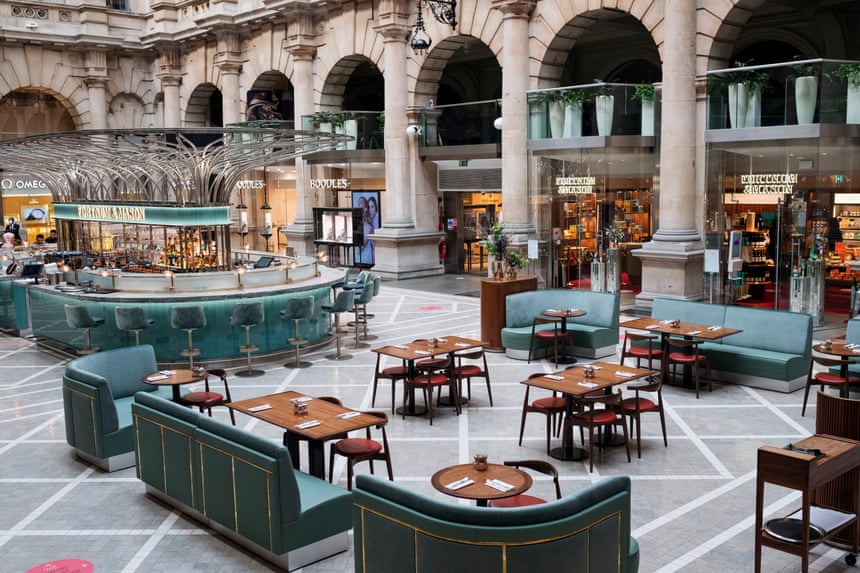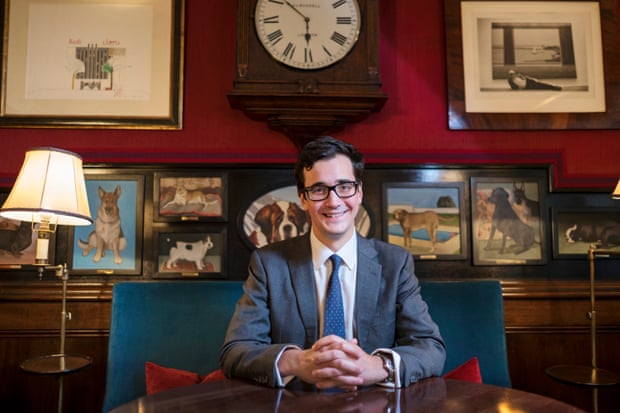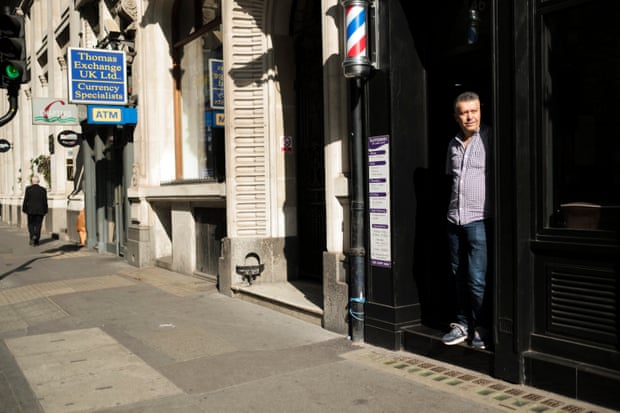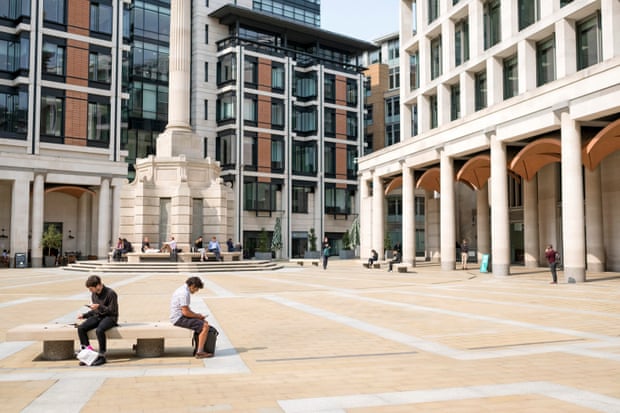
'No one is here': is Covid draining the life from the City of London?
Dean Hooke is waiting for a customer. He has been waiting for one all week.
It is Friday afternoon on St Swithin’s Lane in the City of London, where the tailor’s shop stands in the shadow of Rothschild and Co, a couple of hundred metres from the Bank of England.
Hooke has been in since Monday, and so far his patience has been rewarded by a single City worker coming in to buy a suit.
Most days, he gives up waiting at about 3pm and closes up to go home or get a beer with another tailor, “to drown our sorrows”. “You do see people wandering round,” he says, “but we need them coming in. It’s absolutely dead today.”
Now, at last, a second client arrives, and the two greet each other like long-lost friends. “I’ve got a customer!” says Hooke, with a broad grin. “You OK, Paul?”
“Dean!” says Paul Chapman, a managing director at Tysers Insurance Brokers, who has had his suits made here since Hooke’s father ran the place in the 90s. “You’re alive!”
Hooke – of John W Hooke and Son, where the walls are stained with his father’s cigarette smoke and adorned by two pictures of the Queen – is alive, along with his business, but only just.
While he is only a minnow in the City of London’s vast ecosystem, his situation differs from that of many bigger fish only in scale.
If in past economic crises, London’s financial centre has appeared culpable and yet somehow immune, this crash seems to be as indiscriminate as the virus that caused it – and the smallest players have hardly seen their affluent customers in months.
Even as the locals tell themselves that everything will be all right in the end, banks are contemplating billions in bad debt and the worst white-collar jobs crisis since the early 90s, while the creeping return of Covid-19 appears to be putting the City’s tentative recovery on life support again – and, perhaps, bringing about the end of an era.
A sense that will only have been amplified by this week’s U-turn on the return to work.
Speaking from his high-rise office a few days later, Richard Clarke, a City specialist at Matthews and Goodman property firm, reflects on the panorama in front of him. “I’m looking over the City and it’s very beautiful, and very quiet, and something isn’t right,” he says. “The beating heart of the British economy is not beating.”
Viewed at ground level, the patient seems no healthier. On a typical Thursday in February, 151,741 people got out at Bank tube station; that number plunged to fewer than 2,000 in April. By the first Thursday in September, it was still only 20,806.

The following week, streets around the station echoed not to traffic and footsteps but to a passing police siren, or a lonely construction worker’s drill above, or the fading beat of an Extinction Rebellion protester’s drum.
A giddy group of skateboarding kids attempt huge tricks on the steps next to the statue of the Duke of Wellington, safely touching down without any need to check if cars or commuters might get in their way.
At rush-hour, workers who in normal times resemble a colony of ants swarming out of the tube’s multiple exits seemed more like cautious badgers, creeping out one by one to sniff the air and scuttle to the nearest place of safety.
“I feel like I’m in an alternate reality,” says Julia, 44, on her way to buy a sandwich at Superdrug from her job at a recruitment agency – and wearing jeans to work “for the second time ever”, a transgression that makes her reluctant to give her last name.
“I feel weird about it,” she adds. “But there’s nobody in who’s going to care.”
Advertisement
The usual comparison now for such alternate-reality scenes is 28 Days Later. But in a zombie movie, the ruthless killers do not work from home. For the City, the horror is greater still: not an apocalypse, but an endless Sunday afternoon.
In the 2011 edition of City of London: the History, David Kynaston wrote that as the Square Mile had physically “lost much of its idiosyncratic charm” with the erection of vast skyscrapers, it had become “dominated by vast conglomerates inevitably lacking ‘touch’ and responsiveness”.
Last week, he recalled walking through the area in January and being struck anew by the “hubris of the amount of construction under way”. “It is already so much less physically intimate than it used to be,” he says. “If the traditional working patterns are now fundamentally disrupted, if it becomes less of a physical place, then that trend will be intensified.”
Whether the physical concentration of the financial sector had been the root of its strength in the past he is not prepared to say. “But it’s possible,” he says. “It instinctively makes sense as an argument.” If so, the City’s power, which PwC calculated produced 10.5% of all government tax receipts in 2019 and made it, for better or worse, a tentpole for the British economy, may soon be as dispersed as its workforce.
The relationship between Chapman and Hooke has something of that old intimacy, and by the time the broker leaves, the two had caught up – but there was no new order for a suit.
Chapman, a 36-year veteran of the Square Mile, is making a rare trip to the office for the sake of visibility to his team, “so people can see I’m still here – it brings confidence”.
He views Hooke’s business as just as essential to the City’s identity as his own, and even more precarious. His visit, he says, really was “to make sure Dean’s still alive, because I wasn’t sure if he would be”.
Hooke, a charismatic 51-year-old whose bonhomie is only a little squashed by the current circumstances, bursts out laughing and shrugs.
In normal times, he says, there are three or four customers a day, a level of business that requires the assistance of four others and still leaves him between £3,500 and £4,000 to take home each month. Now, it is about £900, government assistance included, and he can support only one of his usual team.
“I’m getting to the stage where I take no money, I’ve got no money to pay him with,” he says. His landlord’s emails about the rent are getting more urgent, too. “And I’m a sole trader, not a limited company. So he can go after my house.” The bankers do not face that risk, at least.
In a 2008 essay for the London Review of Books, John Lanchester described the City’s vexed love affair with risk as being founded on “a humanist project, an attempt to abolish the idea of unknowable fate and replace it with the rational, quantifiable study of chance”.
Twelve years later, that aspiration looks less romantic than it used to, but the sense that risks offer a prospect as well as a danger continues to colour the City’s response to precautionary coronavirus measures that enjoy popular support elsewhere.
Sitting in the largely empty dining room at his restaurant 1 Lombard Street, Soren Jessen, a former Goldman Sachs executive, says his business is following government guidance to the letter. But he adds: “In a year’s time or whenever, there will be some reckoning that we all collectively had a massive overreaction.
“I think we’ll have to live with it. It’s still going to be here in January, nothing is going to change between now and then. Everything we would plan to do in January we should be doing right away. It’s risk and reward, you have to look at things in that way. The key is just to get through this autumn.”
But with turnover still 50% below where it stood a year ago, he has already had to make some staff redundant. A second lockdown would be “inconceivable”, he says, tapping the table with his fork. “If that happened, we would not reopen … I don’t see how you can close down the whole economy again. I think there would be anarchy.”
At the same time, most of the City workers whose decisions will determine the answer to that question appear as used to working at home as the rest of the country, with most companies allowing 10-20% of staff to return but not necessarily getting even that.

On the first day of the reopening of the Walbrook Club, the 28-year-old managing director, Philip Palumbo, is expecting five tables for lunch, including the two taken by his and his father’s parties. In the event, the other three cancel. “It is painfully quiet,” he says, surveying the empty room, before brightening: “But it’s busy tonight, and on Friday you can’t get a table.”
A positive sign, he says, is that every one of his 500 members have stayed loyal to the club, which occupies a four-storey townhouse nestled incongruously between the Rothschild and Bloomberg buildings, and features John Lennon drawings in the hallway and a taxidermy swan in the dining room.
“We took a direct hit,” he says. “We’re not taking on water, at least.” In the days before lockdown, Palumbo says, “it was like the last days of Rome.”
Afterwards, he had to furlough every member of staff but himself, and wrote personally to each member.
“The City will come back because it sort of has to,” he says. “This is a minor bump in the road.”
A few minutes walk away, the City of London Club has 1,000 members, and a now ominous banner outside proclaiming the creation of a new set of bedrooms where conference facilities used to be.
While work had to stop for a few weeks during the summer, the secretary, Edward Plunket, is confident the update remains a sound investment. But weeks of being the only member of a 45-person team on the premises, sometimes doing the cleaning himself and working in a gloomy building with only his office light on, have not been easy.
“It’s soulless without the members,” he says. “Buildings like this need people in them. Redundancies are an inevitability. Probably 25%. And what’s really painful is that we are a family. I have members of staff who’ve been here 25 years.”
But, in the face of a daily average of 75-80 covers at lunch reduced to 15 or 20, he sees little other choice. “I’m expecting another lockdown,” he says. “That will be much more painful than the first one. Christmas is our busiest time.”
Can his business pivot for a new era? He puffs out his cheeks and gives a great sigh. “No, we, ahh … It will work, because we have to evolve.”
Whatever happens next, says Gina, a twentysomething staffer at a US investment bank, the next iteration of the city will be sharply younger than it was before – in terms of who shows up at the office, at least. She is back in the building, her temperature taken by thermal imaging cameras as she arrives, and prefers it that way.
“I don’t mind being a guinea pig,” says Gina, who asked to use a pseudonym. “You need to be in if you’re younger – senior people might have built those relationships, but if you haven’t done that yet you need to be there in person, not on a Zoom call.”

Hıdır Doğan, who runs Dappermore Barbers in Bishopsgate, is showing up every day, too – not because of the customers, but because he has to pay rent whether he opens his shop or not.
Doğan, 55, who came to the UK from Turkey 25 years ago and has owned his shop for a decade, is used to such heavy foot traffic outside that “when you come out you can’t move, it’s too busy. Now it is like a ghost town. Christmas.”
He would normally have 55 or 60 customers a day, and several barbers working with him. Now he has almost run through his savings. On a recent Monday he sat alone in the waiting area at the front of his shop, staring at his phone.
“I don’t know what is going on, or what’s going to happen,” he says, becoming emotional. “I come in the morning, I go home, no one is here. Everyone is working at home. I don’t know if they are coming back.”
It’s a question being asked inside the Grade I-listed Royal Exchange too. At about 11am on a recent Thursday, the luxurious courtyard – where you can buy Omega watches, or Tiffany jewellery, or take high tea at Fortnum & Mason’s extravagant bar – has welcomed not a single customer in about 20 minutes.

Six impeccably dressed members of staff at Tiffany rearrange display cases and stare at their shoes, while a tinny jazz saxophone track echoes eerily through the courtyard’s towering columns. “It’s this way all the time,” says a waitress at Fortnum’s. “We’re just waiting for things to start again.”
Kynaston is not sure it will. “Historically, they have often on quite important things got their way, and occasionally on really important things not got their way.”
He points to the first world war, “which semi-destroyed the City for half a century”, and Brexit.
In 2011, Kynaston lamented that the 2008 crash created an opportunity to put limits on the City’s power, “the politicians, even if they identified the chance, failed to take it, and who knows when it will come again”.
Should the same chance come again, he predicts “it will be grasped”.
Now it is here – brought not by another grotesque overreach but by a virus that few saw coming - it is hard to blame the City’s foot soldiers if they are not so keen.
Hooke, for one, will not go without a fight. “The shop’s been here since 1894,” he says. “I couldn’t imagine not being here ... we’re the backbone of the industry. It’s the little ones like us that make it tick along.”










